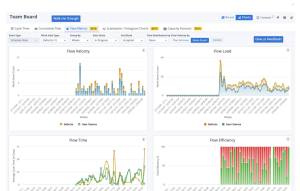A survey of several different industries found inconsistencies in how well employees follow proper procedure, and varying reasons why they don’t.

Image: Getty Images/iStockphoto
A study of how well employees follow the business procedures laid out by their organization surveyed organizations in the financial services, insurance, and government sectors and found out that government employees are the least likely to adhere to the rules.
The study, performed by digital intelligence firm ABBYY, utilized process mining techniques and a survey of leadership to get a feel for why staff do (or don’t) follow their organization’s rules, and found that financial services organization are three times more likely to stick to protocol than government workers, who only do so 15% of the time.
Businesses in the financial services, government, healthcare, insurance, logistics, and transportation industries were all surveyed, and by and large financial services came out as the industry where processes were adhered to the most, with 46% saying they “rigorously” follow them.
Government workers were by far the worst, with only 15% rigorously following processes, 55% mostly following them, and 30% sometimes following them. Other sectors that lacked rigorous following of the rules were insurance, with only 30%, and healthcare with only 33%. Interestingly enough, insurance had the highest percentage of people who rarely followed processes at 4%, and health insurance was the only sector to report people never following processes (2%).
SEE: IT job and salary guide: Highest tech salaries, top-paying cities, and compensation-boosting tips (TechRepublic Premium)
It’s important to follow business processes, says director of product marketing at ABBYY, Reggie Twigg, because of the risks that come with being part of a regulated industry, like the ones covered in the report.
“Banks that are found to be noncompliant with KYC, LIBOR, or other regulations can face investigations of fraud, among other things, that can add up to millions of dollars in discovery and legal defense plus fines. This applies to any industry that is under regulatory review,” Twigg said.
Part of stamping out employees not following procedure is knowing why they aren’t doing so, which ABBYY’s study also reported on. In the case of government workers, who are by far the worst at following procedure, the reasons were somewhat evenly split:
- 44% say they break the rules to meet customer needs;
- 25% say they simply aren’t motivated to follow the rules;
- 31% say they don’t have time to do things by the book;
- 38% say there are simply too many complicated rules to adhere to them all; and
- 25% say the rules are hard to understand.
That breakdown is by far the most even, with other industries tending to clump their reasons into one or two of the above categories:
- In financial services, 50% say they disregard processes to meet customer needs
- Healthcare workers are split between meeting customer needs (42%) and being stunted by overly complex rules (32%)
- The insurance industry is overwhelmingly erring for customer needs, with 62% saying that’s why they do so
- Logistics, like health care, is split between customer needs (40%) and complexity (30%)
- Transportation companies are the most likely to break with policy for customers at 69%.
With that in mind, it becomes clear that customer service needs are the reason why most industries are bending process rules, which is something that is indicative of flaws in the way businesses are building their processes, Twigg said. “Customer experience exposes most process shortcomings. [Those] behaviors are less a reflection on employees, hence why key performance indicators are band-aids, than inadequacies in the processes themselves.”
SEE: Video teleconferencing do’s and don’ts (free PDF) (TechRepublic)
Regardless of the industry your organization operates in, following proper processes is essential. Twigg said that following processes needs to be part of a company’s culture, and that continuous education can help but isn’t always the key.
“Leaders can offer more training, talk with employees about processes, and set specific key performance metrics to motivate employees, but in my experience employees quickly become lax,” Twigg said.
Twigg’s suggestion is to process mine, which is a method of data analytics that determines how effective processes are by “mining” business software for events that indicate whether proper steps are being followed.
“Many organizations are not aware of how their processes actually work and what human activity is needed to work around their vulnerabilities. The quickest solutions are those that narrow into and pinpoint the problem–not create elaborate metrics, training schemes, and performance incentives,” Twigg said.
Also see
Source of Article




